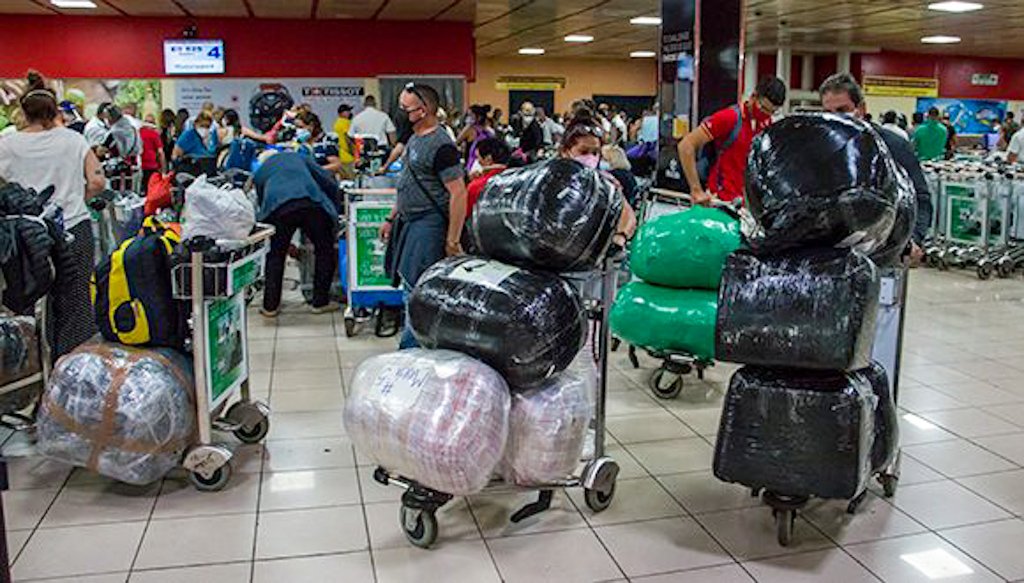The Cuban government relaxed the rules for import non-commercial food, which will allow its citizens to enter the country sausages, canned meat and milk in various varieties, among other products.
The changes were announced by the National Center for Animal Health (Cenasa), belonging to the Ministry of Agriculture (Minag), the entity in charge of sanitary regulations on the island for the importation of food of animal origin by travelers and natural persons, as you refer the official site Cubadebate.
“These regulations are based on international standards approved by the World Organization for Animal Health (OIE) and are aimed at preventing the introduction of biological agents that cause harmful diseases to domestic animals, wildlife and man,” the publication points out, that lists the regulations in force in Cuba on the subject and does not specify a date for the entry into force of the new changes.
The @CENASCuba belonging to @MINAGCuba relaxes the special sanitary regulations for the #import of food of animal origin by travelers and natural persons.
??? https://t.co/72Sc66HqLY pic.twitter.com/o9w9g4gJdj– Caribbean Channel (@CanalCaribeCuba) August 2, 2022
The easing now announced includes facilities for the importation of “canned meat (canned) from cattle, pigs and birds, duly identified and from recognized trademarks”, from a group of authorized countries “due to their current animal health situation and agreements established between services official veterinarians. This group is made up of Spain, Portugal, Italy, the United States, Canada and Mexico, as well as Panama, Costa Rica, Nicaragua, Brazil, Argentina, Chile and Uruguay.
The non-commercial import of sausages is also authorized from these same countries, while it is allowed to import canned seafood originating in any geographical area. The same happens with fluid UHT, condensed, evaporated milk, dairy desserts and powdered milk.
The entry of mature pasteurized cheeses originating from any geographical area or made from ultra-pasteurized milk also has a green light.
Instead, Cenasa announced that absolute import bans are maintained for fresh, frozen, dehydrated or salted meat, with or without bones; edible organ meats; semi-finished meat products (hamburgers, mincemeats, meatballs, meat sticks, nuggets and other breaded products, raw sausages, salamis, spreads, raw ham, raw sausages and bacon, fermented, overcooked, pepperoni, cervelat and other raw products fermented) and semi-cooked products.
This prohibition is extensive to any product or by-product of animal origin with bones, as well as fluid milk and unpasteurized dairy products in general.
Regarding authorizations, the entity explains that “the flexibilities of the products are given by the country where they were made or produced” and, therefore, “the list of eligible countries is given by the country that is reflected on the labels of the products”.
In addition, it specifies that “these facilities and the list of eligible countries could be modified in relation to changes in the animal health situation of the countries of origin”, so “they may be subject to constant changes, which will be systematically updated” by the Ministry of Cuban Agriculture.
All products – the note adds – must arrive in the country “completely packaged, of recognized brands and duly labeled, without breakage in the packaging”, and those “whose packaging suffers any breakage or deterioration that could become a vehicle for etiological agents that cause illnesses, they will be seized and incinerated.
This flexibility for the entry of food into Cuba is announced shortly after a resolution was published that establishes other changes for non-commercial imports on the Island, as part of the package of measures recently announced by the Minister of Economy and Planning, Alejandro Gil . Among the changes announced at the time was that of “defining the non-commercial nature of the importation of miscellaneous goods by their value and weight and by the diversity of the articles to be imported, and not by the physical quantities.”
On customs and the measures announced in Cuba: better later…
Previously, in the midst of the complex economic and health situation that the country was experiencing in the middle of last year, and just after the massive anti-government protests of 11J, the government had already temporarily eliminated the collection of customs duties for food and medicine, a measure that has been extended over time and that for the moment remains in force until next December.
These provisions seek to alleviate the severe crisis that the country is going through, increased by the impact of the pandemic, the sanctions of the United States and the internal difficulties and inefficiencies. The foregoing is reflected in a complex scenario on the Island, marked by the lack of basic products, long lines, systematic and prolonged power cuts and growing inflation, which has increased social discontent and has led the authorities to announce a group of plans and measures that have not yet succeeded in reversing the difficult situation.






